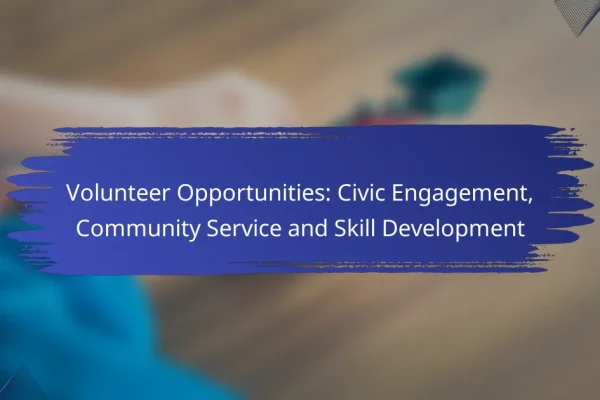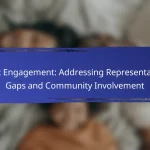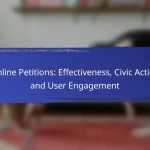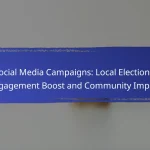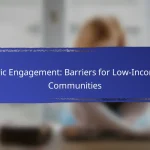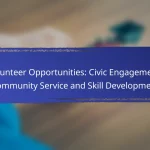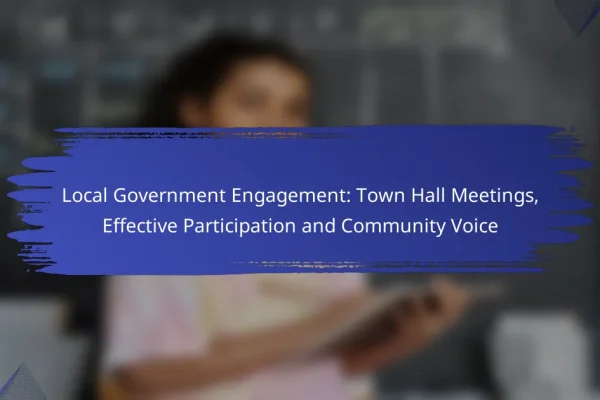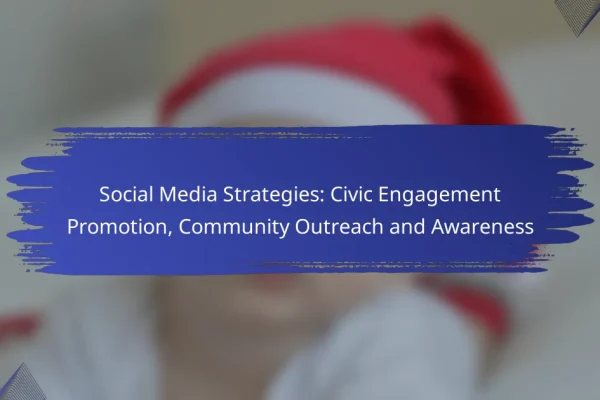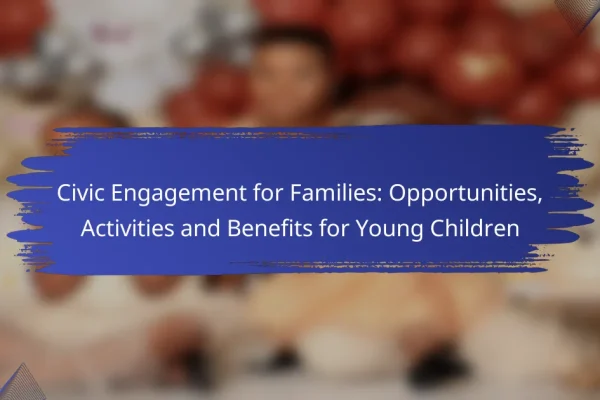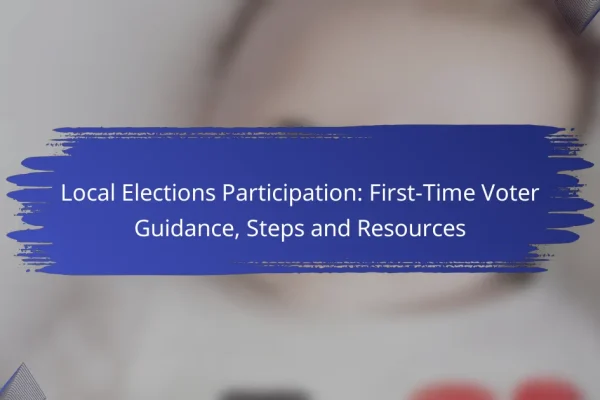How can individuals engage in civic activities in the United States?
Individuals can engage in civic activities in the United States through various means, including voting, attending community meetings, joining organizations, and volunteering. Each of these actions contributes to the democratic process and strengthens community ties.
Voting in local elections
Voting in local elections is a fundamental way for individuals to participate in civic activities. Local elections often determine the leadership and policies that directly affect communities, such as school boards, city councils, and mayors.
To engage effectively, individuals should familiarize themselves with the candidates and issues on the ballot. Researching local voter registration deadlines and polling locations is essential, as these can vary by state and locality.
Participating in town hall meetings
Town hall meetings provide a platform for residents to voice their concerns and engage with elected officials. These gatherings typically allow citizens to ask questions, share opinions, and discuss community issues directly with decision-makers.
To make the most of these meetings, individuals should prepare questions in advance and arrive early to secure a good seat. Engaging respectfully and constructively can lead to productive discussions and foster stronger community relationships.
Joining community organizations
Joining community organizations is an effective way to engage in civic activities and connect with like-minded individuals. These organizations often focus on specific issues such as education, health, or environmental advocacy, allowing members to work collectively toward common goals.
Individuals can find local organizations through community centers, social media, or local government websites. Participating in events and volunteering for projects can enhance one’s understanding of community needs and amplify their impact.
Volunteering for civic initiatives
Volunteering for civic initiatives allows individuals to contribute their time and skills to improve their communities. This can include activities like organizing clean-up days, assisting with voter registration drives, or helping at local shelters.
To get involved, individuals should look for opportunities through local nonprofits, government programs, or community boards. Regular volunteering not only benefits the community but also fosters personal growth and a sense of belonging.
What are the benefits of civic engagement?
Civic engagement offers numerous benefits, including improved community well-being, increased political awareness, and enhanced social connections. By participating in civic activities, individuals contribute to the betterment of their communities while gaining valuable insights into the political landscape.
Improved community well-being
Engaging in civic activities fosters a sense of belonging and responsibility among community members. This involvement can lead to initiatives that address local issues, such as neighborhood safety, public health, and environmental sustainability. For example, community clean-up events not only beautify the area but also promote collective ownership and pride.
Moreover, civic engagement often results in better allocation of resources and services. When residents actively participate in decision-making processes, they can advocate for their needs, leading to improved public services and infrastructure that benefit everyone.
Increased political awareness
Civic engagement enhances individuals’ understanding of political processes and issues affecting their lives. By attending town hall meetings or participating in local advocacy groups, citizens become informed about policies and legislation that impact their communities. This awareness can empower them to make educated decisions during elections and public debates.
Additionally, engaging with local representatives allows citizens to voice their concerns and influence policy outcomes. This direct interaction can demystify the political process and encourage more people to participate in governance.
Enhanced social connections
Participating in civic activities helps build strong social networks within communities. These connections can lead to friendships, collaborations, and support systems that enhance overall quality of life. For instance, volunteering for local organizations can introduce individuals to like-minded peers who share similar values and interests.
Furthermore, strong social ties foster a sense of trust and cooperation among community members, which is essential for addressing collective challenges. Engaging in civic life can create a more cohesive community, where individuals feel supported and motivated to work together for common goals.
How to choose the right civic engagement opportunities?
Choosing the right civic engagement opportunities involves aligning your interests and skills with the needs of your community. This ensures that your contributions are both fulfilling for you and beneficial for those you aim to serve.
Assess personal interests and skills
Start by identifying what you are passionate about and the skills you possess. Consider activities that excite you, such as education, environmental advocacy, or social justice. Your enthusiasm will drive your commitment and effectiveness.
Next, evaluate your skills. Are you a strong communicator, organizer, or problem-solver? Matching your abilities with civic opportunities can enhance your impact and satisfaction. For example, if you excel in public speaking, consider roles that involve community outreach or advocacy.
Evaluate community needs
Understanding the specific needs of your community is crucial. Research local organizations, attend community meetings, or conduct surveys to identify pressing issues. This will help you find opportunities that are not only meaningful to you but also address real challenges faced by your community.
Look for gaps in services or areas where your skills can make a difference. For instance, if there is a lack of educational programs for youth, you might consider volunteering as a mentor or tutor. Engaging with community leaders can also provide insights into where your efforts are most needed.
Consider time commitment
Assess how much time you can realistically dedicate to civic engagement. Opportunities can vary widely in their time requirements, from a few hours a month to full-time commitments. Be honest about your availability to avoid burnout and ensure consistency in your involvement.
Make a list of potential opportunities and their time commitments. For example, short-term projects like community clean-ups may require only a few hours, while ongoing roles in local nonprofits might need a weekly commitment. Prioritize opportunities that fit your schedule and allow for a sustainable level of engagement.
What role do local governments play in civic engagement?
Local governments are crucial in fostering civic engagement by creating opportunities for residents to participate in decision-making processes. They provide the necessary infrastructure and support to encourage community involvement and ensure that citizens’ voices are heard.
Providing resources for community involvement
Local governments offer various resources to facilitate community involvement, such as informational websites, newsletters, and social media platforms. These resources help residents stay informed about local issues, upcoming meetings, and volunteer opportunities.
Additionally, many municipalities provide grants or funding for community projects, which can empower citizens to take initiative and address local needs. This financial support can range from small grants for neighborhood events to larger funding for community development initiatives.
Facilitating public forums
Public forums are essential for civic engagement, allowing residents to voice their opinions and discuss local matters. Local governments often organize town hall meetings, workshops, and public hearings to gather input from the community.
These forums can be held in various formats, including in-person gatherings and virtual meetings, making it easier for citizens to participate. Ensuring accessibility and promoting these events through multiple channels is vital for maximizing attendance and engagement.
Encouraging citizen participation
Encouraging citizen participation involves creating a culture where residents feel empowered to engage with local government. This can be achieved through outreach programs, educational initiatives, and recognition of community contributions.
Local governments can implement strategies such as volunteer programs, citizen advisory boards, and participatory budgeting to actively involve residents in decision-making. By recognizing and rewarding civic participation, governments can foster a more engaged and informed citizenry.
How does civic engagement impact local elections?
Civic engagement significantly influences local elections by fostering community participation and shaping voter behavior. Active involvement leads to higher voter turnout, encourages candidates to address community needs, and ultimately impacts policy decisions that reflect the electorate’s priorities.
Increases voter turnout
Engaged citizens are more likely to vote, which boosts overall voter turnout in local elections. When communities organize events, such as town halls or voter registration drives, they create an environment that encourages participation. Studies suggest that areas with strong civic engagement can see turnout rates increase by 10-20% compared to less active regions.
To maximize turnout, communities should focus on outreach strategies that resonate with local demographics. Utilizing social media, local influencers, and grassroots campaigns can effectively mobilize voters and ensure they are informed about election dates and procedures.
Influences candidate platforms
Civic engagement plays a crucial role in shaping the platforms of candidates running for local office. When citizens actively voice their concerns and priorities, candidates are more likely to incorporate these issues into their campaigns. This responsiveness can lead to a greater alignment between elected officials and the needs of their constituents.
Engaged communities can hold forums or debates that allow candidates to present their views while also addressing local issues. This interaction not only informs candidates but also empowers voters to demand accountability and transparency in their elected officials’ platforms.
Shapes community policies
Active civic engagement directly impacts the development and implementation of community policies. When citizens participate in local governance, they can advocate for policies that reflect their values and address pressing issues. This can lead to more effective and relevant local legislation.
For instance, community groups can collaborate with local governments to propose initiatives on public safety, education, or environmental sustainability. By presenting well-researched proposals and mobilizing public support, these groups can influence policy decisions that benefit the entire community.
What are effective strategies for promoting civic engagement?
Effective strategies for promoting civic engagement include leveraging technology, fostering community connections, and creating inclusive platforms for dialogue. These methods can enhance participation and awareness among citizens, encouraging them to take an active role in their communities.
Utilizing social media campaigns
Social media campaigns can significantly boost civic engagement by reaching a broad audience quickly and efficiently. Platforms like Facebook, Twitter, and Instagram allow organizations to share information, mobilize supporters, and create a sense of community around civic issues.
To run a successful social media campaign, it is essential to define clear objectives, such as increasing voter registration or promoting local events. Engaging visuals, compelling messages, and interactive content can enhance visibility and encourage participation. For instance, using hashtags related to specific civic initiatives can help track discussions and broaden reach.
Be mindful of potential pitfalls, such as misinformation or negative backlash. Always verify facts before sharing and encourage constructive dialogue. Regularly monitor engagement metrics to assess the campaign’s effectiveness and make necessary adjustments to improve outreach and impact.
